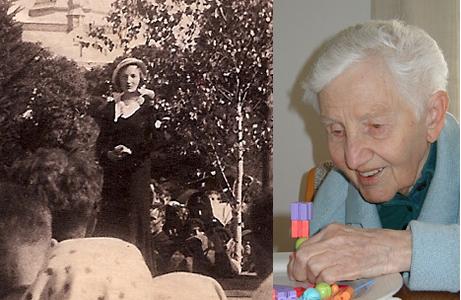Rostyslava Nychay Bohachevsky

| Father | Rev. Stefan Nychay |
| Mother | Evhenia Sanotsky |
| Spouse | Danylo Bohachevsky |
| Children |
Ihor Mary Martha |
| Employment | Housewife |
| Her Story |
Mama knew that women had to organize to boost their individually weak voices, but it was only when mama was already in her nineties that I saw what sort of a woman she really had been. We were in Ukraine, visiting the town in which she had led the local women's association in the 1930s. The Women's League -- now that Ukraine was independent -- had reestablished itself after more than fifty years of Soviet oppression. Its members were complaining of a lack of government funding. My gentle, slight, soft-spoken mama, who would not cross the neighbor's yard for fear of violating private property, let these young women have it: What are you waiting for? This is your country, your life. Roll up your sleeves, get to it, work for what you want! That day, had been feted as a local activist celebrity, a role I had never seen her play in my immigrant childhood. As a new arrival to the U.S.at the end of the 1940s, she kept up her ability to work, but life had knocked the spunk out of her. What she managed to preserve - despite much evidence to the contrary - was a belief in the endurance of goodness. Mama was born in 1909 had watched two world wars march literally through her back yard. Fresh out of high school she married a veteran of the wars against the Bolsheviks, a Polish prisoner of war, an irrepressible bundle of energy who belied his 19 year age lead. He became a lawyer and eventually they started leading a comfortable life. I came along as an afterthought, ten and nine years after a brother and sister. Mama was an activist in the Ukrainian Women's League, travelling through villages, setting up kindergartens, and health and legal-aid cooperatives. Less than five years later, the Second World War took her older children into Nazi German youth-work brigades, while we were put into a labor camp. The War robbed me of a sense of wonder, but mama tried to sneak it back through a book of poetry she used to teach me to read. Later she made up games to create an alternate reality for me. When the Second World War ended, not yet knowing where the older children were, my parents, convinced that the Western Allies would keep Vienna, headed to that city and enrolled in the university. I thought it was OK to help my father pick up cigarette butts so he could have something to smoke. It was there that mama, the former lady of the house, learned to sew, a skill that got her a job after we all landed in the United States. My parents found the older children through the budding international relief organizations. My father kept the death of my grandfather, en-route to new labor camps in Siberia, secret from mama, who was ailing. She found out, of course, just at the time that her son was fighting the communists in Korea. She did what my father feared she would do -- sobbed in public. Mama joined the Ukrainian National Women's League of America and again found her niche, setting up cultural programs, collecting clothes for the needy, helping young mothers raise bi-lingual children. When I was accepted to the University of Pennsylvania, she was ecstatic. When I finally decided to marry, she promised to quit her job and help care for our children when they came so I could have a career. She took my Ph.D. in stride, happily mixing with tots and students at Columbia University's urban campus. It was only after I wrote a book on the historic origins of the Ukrainian women's organizations, Feminists Despite Themselves, in which I analyzed the functioning of something I called "pragmatic feminism" that I realized the full scope of the older women's organizations -- they made everything else possible. They helped women realize the historical roots of their own feminism and not see it as a foreign import. I dedicated the book to my mother, and to women such as she. When Ukraine became independent and I went to work there, Mama asked to join us. There she encouraged Ukrainian women to take on not just leadership positions, but leadership itself. But she found her home town, even its regional center, too provincial, too passive. She sensed the vibrancy of goodness on the rise, and she needed a bigger forum to experience its resurgent power, such as the capital. She was overjoyed that her native country finally had not only women's organizations, but centers for the study of gender. And she took some credit for it. |
